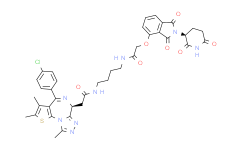| DC60902 |
MS41
|
MS41 is a selective eleven-nineteen leukemia (ENL) PROTAC degrader, with DC50s of 3.50 nM (MV4;11), 2.84 nM (SEMK2), 3.03 nM (Jurkat), and 26.58 nM (KASUMI1), respectively. MS41 effectively inhibits the growth of ENL-dependent leukemia cells, induces G1 cell cycle arrest and increases apoptosis. MS41 reduces the chromatin occupancy of ENL-associated transcription elongation machinery, and suppresses oncogenic gene expression and leukemia progression. |
| DC60901 |
PROTAC BTK Degrader-11
|
PROTAC BTK Degrader-11 is a PROTAC degrader that can break down BTK, with a DC50 of 1.7 nM. |
| DC67514 |
Abd110
|
Abd110 (compound 42i) is a PROTAC molecule derived from lenalidomide that specifically targets ATR kinase for degradation. This compound demonstrates remarkable selectivity, effectively reducing both ATR and phospho-ATR levels while sparing related DNA damage response kinases ATM and DNA-PKcs. |
| DC67513 |
MS8847
|
MS8847 represents a novel PROTAC molecule that selectively targets EZH2 for degradation by recruiting the VHL E3 ubiquitin ligase complex. This compound mediates potent, proteasome-dependent elimination of EZH2, demonstrating significant anti-proliferative effects against both AML and TNBC cell lines. |
| DC67512 |
PROTAC BRD4 Degrader-21
|
PROTAC BRD4 Degrader-21 (Compound 74) is a potent and selective degrader of BRD4, demonstrating robust tumor growth suppression in mouse xenograft models. Its efficacy supports its potential as a promising candidate for anticancer drug development. |
| DC67462 |
YJ1206
|
YJ1206 is an orally bioavailable PROTAC compound that selectively degrades CDK12 and CDK13, demonstrating potent activity (IC50 = 12.55 nM) in VCaP cells. It induces DNA damage, triggers apoptosis, and drives tumor regression in treatment-resistant prostate cancer PDX models, highlighting its therapeutic potential. |
| DC60681 |
SD-436
|
SD-436 is a highly potent and selective STAT3 degrader with DC50 of 0.1 nM in human PBMCs and displays >10,000-fold degradation selectivity for STAT3 over other STAT proteins. |
| DC65811 |
KT-253
|
KT-253 is a potent small molecule that stabilizes p53 while simultaneously acting as a PROTAC to degrade MDM2 (DC50 = 0.4 nM). It demonstrates strong antiproliferative effects in RS4;11 leukemia cells (IC50 = 0.3 nM), inducing G2/M cell cycle arrest and apoptosis. In vivo studies confirm its antitumor activity in mouse models. |
| DC65324 |
NX-2127
|
NX-2127 is a potent, selective, and orally bioavailable BTK degrader with Kd of 18 nM (for WT BTK), 45 nM (BTK C481S), 18 nM (BTK T474I), 44 nM (BTK M437R), 97 nM (BTK V416L), and 88 nM (BTK L528W), respectively. NX-2127 efficiently engages the intracellular ubiquitin-proteasome system to simultaneously bind both BTK and the CRBN E3 ubiquitin ligase complex, inducing polyubiquitination and proteasome-dependent degradation of BTK, IKZF1, and IKZF3. |
| DC60447 |
ARV-766
|
ARV-766 is an orally active and potent proteolysis targeting chimera (PROTAC) protein degrader. ARV-766 degrades wild-type androgen receptor (AR) but also relevant AR LBD mutants, including the most prevalent AR L702H, H875Y, and T878A mutations[1]. |

 To enhance service speed and avoid tariff delays, we've opened a US warehouse. All US orders ship directly from our US facility.
To enhance service speed and avoid tariff delays, we've opened a US warehouse. All US orders ship directly from our US facility.




















